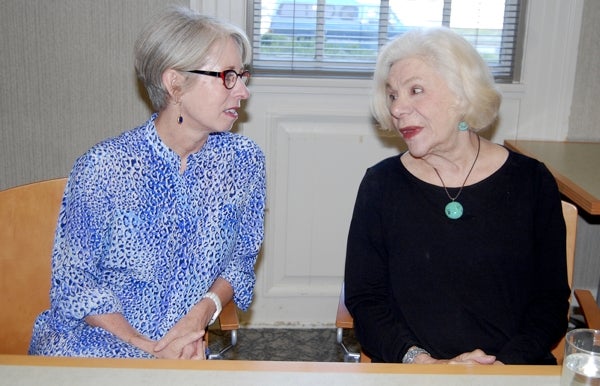Dannye Powell and the craft of poetry
Published 12:01 am Sunday, June 19, 2016

- Deirdre Parker Smith/Salisbury Post Author and poet Jennifer Hubbard, left, interviews poet and journalist Dannye Romine Powell during the first event of the Summer Reading Challenge.
By Deirdre Parker Smith
deirdre.smith@salisburypost.com
SALISBURY — To poet Dannye Romine Powell, a poem does not spring, fully formed, from her mind.
Danney revises her poetry 20, 30 or more times. She crafts it with care.
When she talks about her new collection, “Nobody Calls Me Darling Anymore,” she points to poems she likes that are “not right.” And she enjoys hearing someone else read a poem that is right.
Dannye was in Salisbury last Tuesday for the first installment of the Summer Reading Challenge.
Her friend and student, Jennifer Hubbard, a poet and fiction writer, asked the questions, read some of the poems and invited the audience to ask questions.
About 30 people showed up to listen and learn. It’s a loyal group that has attended many Summer Reading Challenge events.
Dannye was gracious and honest about her work, saying poetry does not have to be difficult or unapproachable.
Jennifer said Dannye’s poetry is good for someone new to poetry, someone exploring. Dannye uses plain words, expressing things we recognize, yet intimating more than what’s on the page.
Here are some of the questions and answers:
Jennifer: “How do poets see the world differently than the average person? Or do they?”
Dannye: “I don’t see the world any differently, not when I’m looking at trees or something like that.
“It’s only when I’m by myself on Thursday mornings and that’s from years of training that allows me access to the kind of thinking that leads to poetry. In this mode, something happens. Maybe it’s an accumulation of visual images.”
Dannye has a 92-year-old friend, Julie, in her writing group who wakes up at 3 a.m. and writes. The poems just come. “It’s some sort of electrical impulse that hits her. … Any other time she’s a little vague, funny, fitful.”
Jennifer: “How do people do it?”
Dannye: “I do believe in a muse that stimulates us, feeds us. It’s a part of us that’s not available any other time, and I don’t mean it in a hokey way.”
Betty Mickle asked Dannye if something always comes.
“Not all the time, and it’s not all good. … A book of 30 poems takes 150 or 200 or more to get those 30.
Jennifer: “Which of these poems do you thing rises to the top?”
Dannye: “Confession,” because the narrator is unreliable. It’s about a new mother turning her son over to her mother for the first few weeks. In the poem, the new mother washes and rewashes her son’s blue blanket, avoiding baby. But the words of the poem never say that. The narrator, the new mother, does not realize what she’s doing.
“It’s a mystery that goes on while you write. I didn’t realize the mother was becoming useless until after I wrote the poem.”
Jennifer: “We all know these words, so why can you write the poem and we can’t? What is it? How do you arrange the words?”
Dannye: “I use repetition, some internal rhyme. … One of the joys of the poem is the internal rhyme.” She looks for echo words, words that are not exact rhymes, like moon and cool.
Jennifer: “Which poem would not win a contest?”
Dannye: “I struggled so hard with one, ‘Child Carrying Child,’ ” I had two poems about it and neither one was working, so I put them together, and it still doesn’t work.”
Jennifer read the poem. “It’s not right, but it is very cathartic,” Dannye said, sharing that her granddaughter is the child of the poem.
After reading another poem about Powell’s mother and her imagination, Jennifer said, “You’re writing to discover something you could not articulate.
“That’s what poetry is all about,” Dannye said.
The title poem, “My Mother’s Dead and Nobody calls Me Darling Anymore” is a universal experience for all people who are aging and losing parents.
Jennifer: “Why don’t you write about happy things?”
Dannye: “Happy things don’t knife into us like the unhappy. Happy is good, and hard to express.”
Jennifer: “How do you order your poems?”
Dannye: “It’s so hard, so hard. You have to be intuitive.” She said Julie is the best of her group at ordering a manuscript.
“You never put too many long poems together, never put too many sad poems together.” She had to order the poems about her mother so that she was alive, alive and then gone.
An audience member asked her what it was like to come out of the writing, and Dannye quickly responded, “Relief!”
Jennifer: Do you tell people you’re a poet?
Dannye: “No,” she said, laughing.
At the July 12 installment of the Summer Reading Challenge, Tara Gilstrap, a visiting professor of English at Catawba College, will discuss Lee Smith’s most famous novel, “Fair and Tender Ladies.”
“Dimestore,” Smith’s collection of autobiographical essays, was published in March. The book discussion will again be at Rowan Public Library headquarters at 7 p.m.


